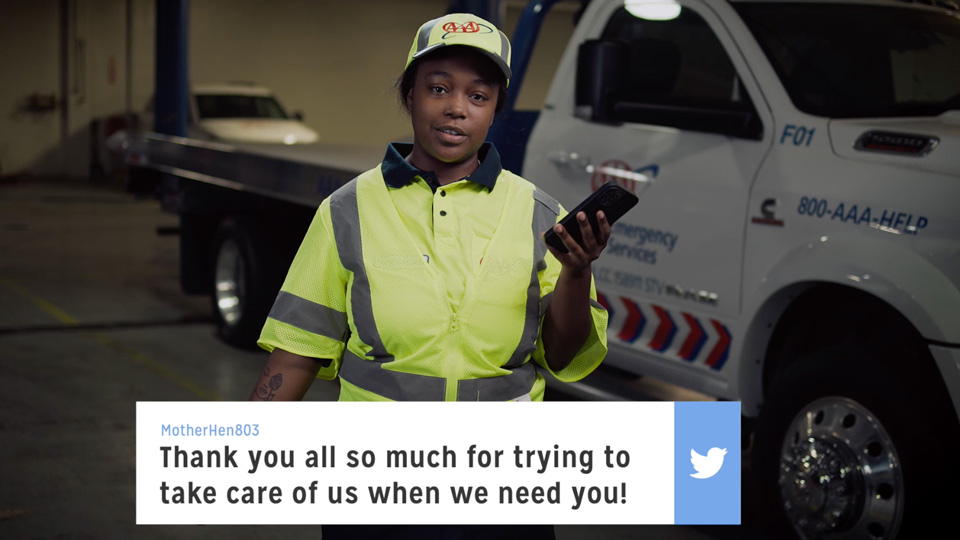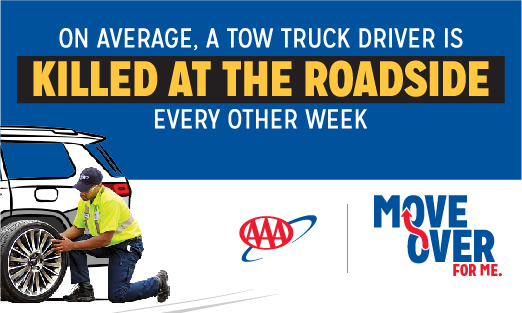

To ensure you receive the best service possible,
please enter your zip code below:
Every day, tow truck operators and other first responders brave dangerous highway conditions to rescue motorists around the country. Sadly, some of them never return home to their families. With about 23 roadside workers (one every two weeks) losing their life each year and hundreds more sustaining injuries while assisting motorists, AAA wants to help.
We are committed to raising awareness about the importance of Move Over laws and the dangers associated with working at the roadside. A resolution has been filed in Congress to establish a National Move Over Law Day.
Resolutions like these bring much-needed attention to the issue and are a great first step to create awareness of the problem. We would like you to contact your legislators and urge them to support this resolution. As a member of our AAA family, your voice is important.
Since 2007, AAA has been Instrumental In passing Move Over laws in all states, including advocating for this legislation to cover tow truck drivers and first responders. Additionally, AAA has participated in educational and advocacy initiatives, creating public service announcements and reaching out to state legislative officials. But there is more work to be done.
Using our social media channels, we have tried to educate motorists about the importance of following the Slow Down Move Over law so our service technicians can do their jobs safely. What follows is a video with our service technicians’ reactions to some of the positive and negative comments we received to our education efforts on social media. We’ll utilize this video to further humanize our technicians who risk their lives each day on the road.

According to the National Highway Traffic Safety Administration, nearly 350 motorists are struck and killed each year while outside their vehicle on the roadside. While all states have a Slow Down, Move Over law to protect emergency responders, AAA is advocating that this law be improved to apply to all disabled vehicles on the roadside.
If you’ve ever had a flat tire or run out of gas or otherwise stuck on the road, you know it can be a dangerous and scary situation with cars speeding by you. In fact, a recent AAA survey tells us that 97% of respondents would be concerned about traffic passing at high speeds if they were stopped on the roadside. AAA is asking all drivers to make better habit of moving over for any vehicle stranded on the roadside.



For Drivers:
• Remain alert. Avoid distractions and focus on driving.
• Keep an eye out for emergency vehicles - including tow trucks - that have their lights on as well as cars that have their flashers on. Move over one lane when you see them and if you can't move over, slow down to safely pass them.
• Be a good passenger. Help identify roadway issues and remind the driver to slow down and move over.
• Watch for people on the roadside. People may be in or near a disabled vehicle. Just because you don't immediately see them doesn't mean they aren't there.
For Stranded Motorists:
• Pull as far over on the shoulder as safely possible to create more distance between your vehicle and passing traffic.
• Turn your hazard lights on so other drivers are aware you are there.
• If you are able to safely make it to the next exit or stopping point. do so.
• Call for assistance via phone. website or the AAA Mobile app.
• Remain with your vehicle as long as it's safe to do so.
• If getting out of your vehicle. watch the oncoming traffic for a good time to exit. and remain alert and close to your vehicle. Avoid turning your back to traffic whenever possible.
Keep in mind that the specific requirements for speed reduction can vary from state-to-state. so be sure to check the exact guidelines for Move Over laws in your area.